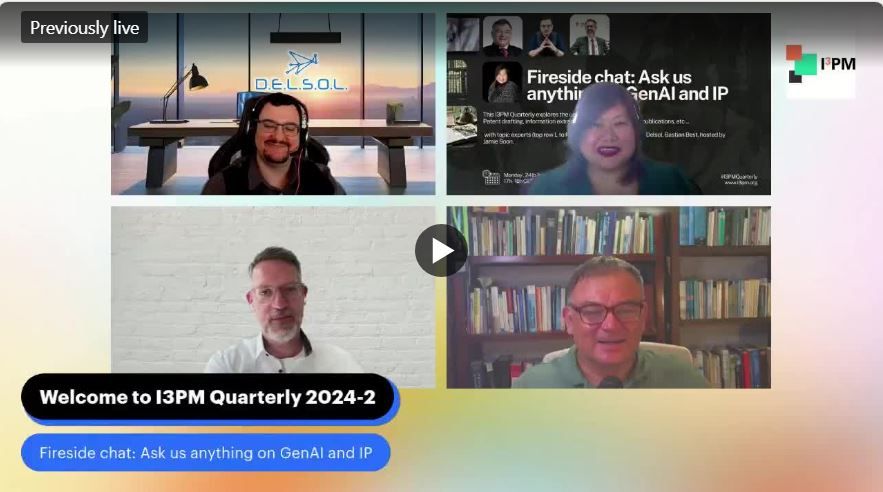Now this was an interesting discussion, lead by Jamie Soon-Kesteloot, and with Bastian Best and Dr. Benjamin DelSol.
We have touched on the following matters:
Fears and Concerns Related to Generative AI
As generative AI evolves, people worry about mastering the technology, data security, and how it might affect their work quality. Education and practice can help ease these fears.
Addressing Security and Confidentiality
Using offline tools and having agreements with AI providers can help keep data secure. Good data security practices build trust in AI.
Applications of Generative AI Beyond Patent Drafting
Generative AI can help with drafting forms, searching for prior art, translations, idea generation, patentability assessments, and IP strategy management, enhancing various IP tasks.
Evolution of Strategies with AI Tools
AI could lead to more patent filings, but focusing on quality rather than quantity is essential to add value.
Inference Quality with Increasing Content Window Sizes of AI Models
As AI models handle more data, using effective prompts and managing context is key to keeping outputs accurate and reliable.
Drafting Patent Applications for Similar Inventions from Different Clients
AI won't produce identical drafts for similar inventions from different clients if inputs are diverse and conflicts of interest are managed.
Future of the IP Profession with Generative AI
Generative AI will transform the IP profession, making roles more strategic. While some tasks might be automated, human expertise will still be vital.
Impact on Patent Examiners
AI will help patent examiners assess patentability and improve efficiency, leading to better and quicker examinations.
The link to the original event is here https://www.linkedin.com/events/7209554185703280640/comments/
If the above link does not work in your country, the full video is here: https://www.dropbox.com/scl/fi/80z5axj10kf46d8rznkhq/1-Fireside-chat_-Ask-us-anything-on-GenAI-and-IP-_-LinkedIn.mp4?rlkey=i6a5rhjt23h7lyiyu8oeo3wx8&dl=0
And this is the timeline of the video above:
00:00 – 01:33 Jamie introduces the fireside chat, the vision of i3 PM, and the panelists.
01:33 – 03:16 Bastian introduces himself and his background with generative AI, particularly ChatGPT.
03:16 – 04:31 Benjamin introduces himself and discusses his journey into using AI tools due to health issues and productivity needs.
04:31 – 06:44 Martin introduces himself and his experience with programming patent drafting software and using AI tools for drafting patents.
06:44 – 07:54 Jamie summarizes the panelists' backgrounds and opens the discussion on fears related to generative AI.
07:54 – 08:23 Benjamin highlights common fears: complexity, fear of prompts, and confidentiality.
08:23 – 10:47 Bastian discusses security concerns and some patent attorneys' mindsets about automation and efficiency.
10:47 – 16:14 Martin classifies users into four groups based on their fears and needs, addressing data security, confidentiality, and other potential issues.
16:14 – 18:00 Jamie summarizes the discussed fears, emphasizing managing irrational fears through education and practice.
18:00 – 22:56 Panelists discuss how patent attorneys can address concerns about security and confidentiality when using AI-assisted tools.
22:56 – 28:00 Panelists discuss using LLM-powered tools for drafting invention disclosure forms and prior art searches, and other IP activities.
28:00 – 31:34 Discussion on when to start using generative AI tools, with the consensus being that the best time is now.
31:34 – 35:15 Panelists address the evolution of strategies with AI tools, noting no significant increase in filing volumes yet but emphasizing quality.
35:15 – 39:01 Panelists discuss maintaining inference quality with increasing content window sizes of AI models.
39:01 – 41:30 Addressing concerns about drafting similar patent applications for different clients and maintaining diversity in input.
41:30 – 45:34 Discussion on the future of the IP profession with generative AI, emphasizing the need for IP professionals to evolve.
45:34 – 47:19 Panelists discuss the impact of AI on patent examiners, predicting similar effects as on IP attorneys.
47:19 – 50:00 Panelists provide their one-liner takeaways and advice for the audience regarding AI in IP.
The content of this article is intended to provide a general guide to the subject matter. Specialist advice should be sought about your specific circumstances.


